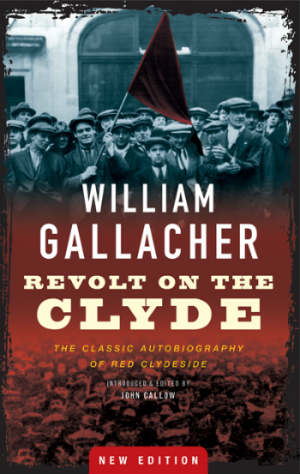
William Gallacher’s account of the early-twentieth-century socialist movement in Glasgow shows how we can challenge our rulers today, argues Richard Allday

William Gallacher, Revolt on the Clyde (Lawrence and Wishart 2017), vi, 201pp.
Scotland has produced a disproportionate number of significant figures for the British working-class movement, and among the more attractive (as well as argumentative) personalities Willie Gallacher undoubtedly shines bright.
Born on Christmas Day 1881, Gallacher came to radicalism in his teens, was a socialist by the time he entered his twenties and a Marxist by the time he left them. A founding member of the Communist Party of Great Britain, he was Scotland’s first (and so far, only) Communist MP, from 1935 to 1950, and was a leading member of the Communist Party from its inception until he stood down as its President in his eighties.
Self-educated (he left school at the age of twelve) he nevertheless had an unslakeable thirst for knowledge which, coupled with an abiding hatred of injustice and oppression, and an inherent disrespect for imposed authority, predisposed him to radical politics. In Scotland, at the turn of the twentieth century, this meant socialist politics. This book, Revolt on the Clyde, although originally published with the sub-title, An Autobiography, is far more a biography of the Scottish labour movement of the early twentieth century.
Although written in the first person, and consisting almost entirely of personal experiences, it is absolutely not the story of William Gallacher, nor is it intended to be. Originally written on his election to parliament, it was intended to achieve two ends. One undoubtedly was to use his prominence to popularize the Communist Party and its politics, and this was certainly the intention of the CP leadership.
But for Gallacher himself, there was an equally compelling reason for it. Written in the mid-30’s, less than a decade after the sell-out of the General Strike by the TUC and Labour Party leadership, at a time of mass unemployment (the book was published the same year as the ‘Jarrow Crusade’), Gallacher clearly wanted to remind readers that moral outrage is not of itself sufficient; that rage at the immorality of the system must be accompanied by organized opposition. The story of ‘Red Clydeside’ was a call to arms, a reminder that our class has a history that needs to be told and re-told, that organized labour, with a combative leadership, can move political mountains.
This is the story of how socialists organized the campaigns that ended rack-renting in Glasgow; that organized miners to strike against conscription; that led the campaign for the forty-hour week; that organized the mass picketing which shut down engineering. It tells of the campaigning against the obscenity of the First World War and how that achieved mass support (including from the Discharged Soldiers and Sailors Federation). The socialist movement there raised such fear in our rulers that they placed tanks on the streets of Glasgow, launched brutal armed attacks on workers’ demonstrations, and attempted to fit up the leaders of the Clyde Workers Committee on charges of insurrection.
Running through it all is the wit and bite of Gallacher himself, a man whose integrity, humour, and self-confidence (but never arrogance) achieved such respect as to ensure he played a leading role in the most tumultuous events of his time.
Above all, for a twenty-first-century audience, it is a re-affirmation of the potential for principled opponents of austerity, nationalism and militarism to find a mass audience, and of the necessity to reach out and find allies, to build social movements to challenge the elites. It also underlines the qualitative difference made by organising in the workplace as well as the community. It is also a stark reminder of the brutality of the existing order, and our rulers’ ultimate reliance on state violence to maintain their privilege.
Though Gallacher himself endured a number of prison sentences, he never allowed it to weaken his commitment to active opposition to injustice. So, it is testament to his generosity of spirit that he understands that prison can break people’s spirits, indeed that is one of the purposes of political imprisonment. Sometimes it physically breaks them although the will to resist remains; sometimes the psychological damage is permanent. Gallacher’s comment (p.107) on the damage prison did to Johnny Muir is both touching and an indictment.
Having said this, the book is not bleak; rather, it is a celebration of a confident working class, politically conscious, and challenging the powers that be. It does not pretend that every decision was right, but it is unapologetic in defending our right to make our own mistakes.
One of the minor glories of the book is Gallacher’s pen-portraits of many of the characters that appear in the book. Whether it is Mme. Sorge and Guy Aldred at an anti-militarist meeting (p.33); Arthur Henderson acting as Lloyd George’s bagman (pp.73-4); or (best of all) his puncturing of the Churchill myth (pp.145-6), Gallacher’s wit and acuity provide insight into many of the leading actors of the time (as well as allowing him to settle a few old scores). This is not to suggest that all of Gallacher’s characterisations are accurate – Harry McShane explicitly disagrees with Gallacher’s assessment of the final months of John Maclean’s life, and his assessment of Peter Petrov (Harry MacShane and Joan Smith, Harry McShane: No mean Fighter, Pluto Press 1978, p.151) – but many of them are amusing, and often perceptive.
This is a book to read and enjoy, as well as learn from. Above all, it is a reminder of just how close Glasgow’s workers came to challenge the ruling order successfully, and how much it scared our rulers. At a time when Jeremy Corbyn has revitalized British politics, its re-publication is serendipitous. If it could be done then, it can be done now.

